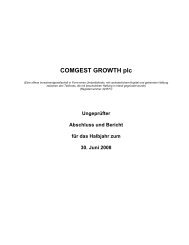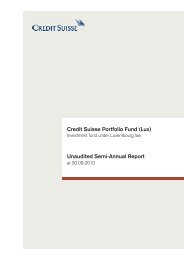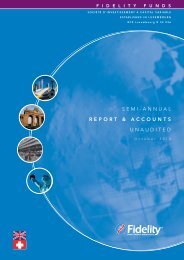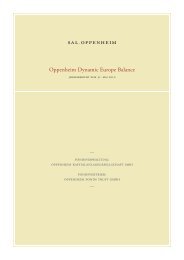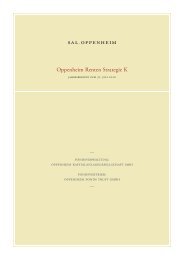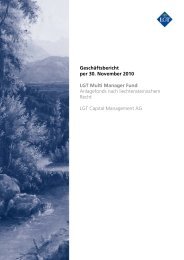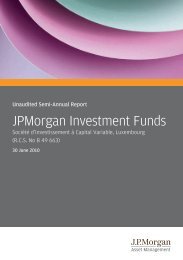Verkaufsprospekt
Verkaufsprospekt
Verkaufsprospekt
Erfolgreiche ePaper selbst erstellen
Machen Sie aus Ihren PDF Publikationen ein blätterbares Flipbook mit unserer einzigartigen Google optimierten e-Paper Software.
'emerging' or 'developing' markets entail risks which<br />
include the possibility of political or social instability,<br />
adverse changes in investment or exchange control<br />
regulations, expropriation and withholding of dividends<br />
at source. In addition, such securities may trade with<br />
less frequency and volume than securities of companies<br />
and governments of developed, stable nations and<br />
there is also a possibility that redemption of Units following<br />
a redemption request may be delayed due to the<br />
illiquid nature of such investments.<br />
Political and Economic Risk - Russia: Investments in<br />
companies organised in or who principally do business<br />
in the independent states that were once part of the<br />
Soviet Union, including the Russian Federation pose<br />
special risks, including economic and political unrest<br />
and may lack a transparent and reliable legal system<br />
for enforcing the rights of creditors and Unitholders of<br />
the Sub-Fund. The standard of corporate governance<br />
and investor protection in Russia may not be equivalent<br />
to those provided in more regulated jurisdictions. While<br />
the Russian Federation has returned to positive growth,<br />
is generating fiscal and current account surpluses, and<br />
is current on its obligations to bondholders, uncertainty<br />
remains with regard to structural reforms (e.g. banking<br />
sector, land reform and property rights), the economy's<br />
heavy reliance on oil, unfavourable political developments<br />
and / or government policies, and other economic<br />
issues. Investment in Russian stock exchanges<br />
is restricted to MICEX and the RTS stock exchange.<br />
Evidence of legal title to shares in a Russian company<br />
is maintained in book entry form. In order to register an<br />
interest of the company’s shares an individual must<br />
travel to the company’s registrar and open an account<br />
with the registrar. The individual will be provided with an<br />
extract of the share register detailing his interests but<br />
the only document recognised as conclusive evidence<br />
of title is the register itself. Registrars are not subject to<br />
effective government supervision. There is a possibility<br />
that the Sub-Fund could lose its registration through<br />
fraud, negligence, oversight or catastrophe such as a<br />
fire. Registrars are not required to maintain insurance<br />
against these occurrences and are unlikely to have<br />
sufficient assets to compensate the Sub-Fund in the<br />
event of loss.<br />
Below Investment Grade Debt Securities: An investment<br />
in high yield securities, or below investment<br />
grade debt securities, meaning securities rated below<br />
Baa3 by Moody’s or below BBB- by Standard and<br />
Poor’s, sometimes referred to as "junk bonds", or low<br />
credit quality securities involves a higher degree of risk<br />
than investment in investment grade debt securities.<br />
Issuers of these securities are often highly leveraged,<br />
so that their ability to service debt obligations during an<br />
economic downturn may be impaired. The lower ratings<br />
of securities reflect a greater possibility of adverse<br />
changes in the financial condition of the issuer, which<br />
may impair the ability of the issuer to make payments of<br />
interest and principal. The risk of loss due to default in<br />
payment of interest or principal by such issuers is significantly<br />
greater than in the case of investment grade<br />
securities because such securities frequently are subordinated<br />
to the prior payment of senior indebtedness.<br />
In the case of default or winding up of an issuer of below<br />
investment grade securities, there is a greater risk<br />
that the capital / assets of the issuer will be insufficient<br />
to meet all of its liabilities and the holders of below<br />
investment grade securities, (who rank as unsecured<br />
PineBridge Merger Arbitrage Fund<br />
creditors) could in such circumstances lose their entire<br />
investment. An economic downturn or a period of rising<br />
interest rates could adversely affect the market for<br />
these securities and reduce the Sub-Fund’s ability to<br />
sell these securities (liquidity risk).<br />
The market for below investment grade rated securities<br />
may be thinner and less active than that for higher<br />
quality securities which can adversely affect the price at<br />
which securities can be sold. To the extent that there is<br />
no regular secondary market trading for certain lower<br />
rated securities, the investment manager may experience<br />
difficulty in valuing such securities and in turn the<br />
Sub-Fund’s assets.<br />
Credit Risk: There can be no assurance that the issuers<br />
of securities or other instruments in which a Sub-<br />
Fund may invest will not be subject to credit difficulties,<br />
leading to either the downgrading of such securities or<br />
instruments, or to the loss of some or all of the sums<br />
invested in such securities or instruments or payments<br />
due on such securities or instruments. Sub-Funds may<br />
also be exposed to a credit risk in relation to the counterparties<br />
with whom they transact or place margin or<br />
collateral in respect of transactions in FDI and may bear<br />
the risk of counterparty default. When a Sub-Fund invests<br />
in an security or other instrument which is guaranteed<br />
by a bank or other type of financial institution there<br />
can be no assurance that such guarantor will not itself<br />
be subject to credit difficulties, which may lead to the<br />
downgrading of such securities or instruments, or to the<br />
loss of some or all of the sums invested in such securities<br />
or instruments, or payments due on such securities<br />
or instruments.<br />
Financial Derivative Instruments: The prices of derivative<br />
instruments, including futures and options, are<br />
highly volatile. Price movements of forward contracts,<br />
futures contracts and other derivative contracts are<br />
influenced by, among other things, interest rates,<br />
changing supply and demand relationships, trade, fiscal,<br />
monetary and exchange control programs and<br />
policies of governments, and national and international<br />
political and economic events and policies. In addition,<br />
governments from time to time intervene, directly and<br />
by regulation, in certain markets, particularly markets in<br />
currencies and interest rate related futures and options.<br />
Such intervention is often intended directly to influence<br />
prices and may, together with other factors, cause all of<br />
such markets to move rapidly in the same direction<br />
because of, among other things, interest rate fluctuations.<br />
The use of FDI also involves certain special risks, including:-<br />
(1) dependence on the ability to predict<br />
movements in the prices of securities being hedged and<br />
movements in interest rates, (2) imperfect correlation<br />
between the price movements of the derivatives and<br />
price movements of related investments, (3) the fact<br />
that skills needed to use these instruments are different<br />
from those needed to select the Sub-Fund’s securities,<br />
(4) the possible absence of a liquid market for any particular<br />
instrument at any particular time, (5) possible<br />
impediments to effective portfolio management or the<br />
ability to meet redemptions, (6) possible legal risks<br />
arising in relation to derivative contract documentation,<br />
particularly issues arising relating to enforceability of<br />
contracts and limitations thereto, (7) settlement risk as<br />
when dealing with futures, forwards, swaps, contracts<br />
for differences the Sub-Fund’s liability may be poten-<br />
| 263



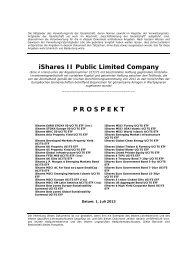
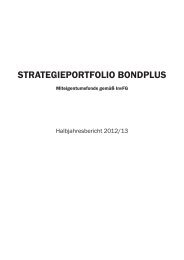
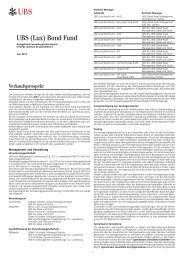
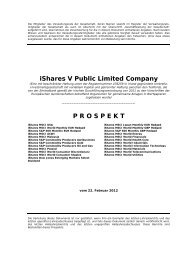
![Prospectus Simplifié daté de [Mars] 2005](https://img.yumpu.com/18875582/1/190x245/prospectus-simplifie-date-de-mars-2005.jpg?quality=85)
